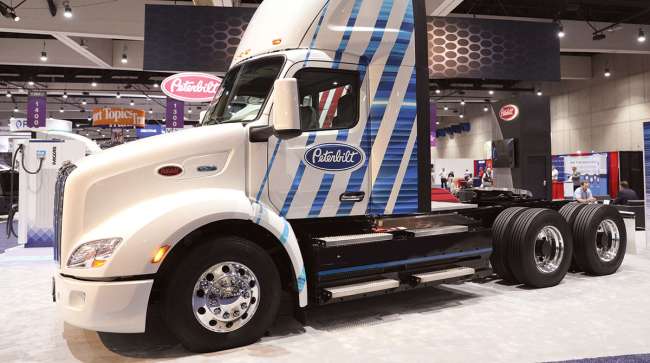Features Editor
Fleet Maintenance Providers Prepare for Electric Trucks

[Stay on top of transportation news: Get TTNews in your inbox.]
As electric vehicles gradually make their way into commercial trucking operations, fleet maintenance managers are beginning to draft EV preventive maintenance plans for everything from electric forklifts to battery-electric Class 8 trucks.
Trucking leaders discussed how such standards could help guide maintenance and repairs and enable industry partnerships during a session at the fall meeting of American Trucking Associations’ Technology & Maintenance Council in October.
For some managers, the initial challenge is getting their technicians to buy into EV maintenance, said Taki Darakos, vice president of vehicle maintenance and fleet services at Pitt Ohio.
While some technicians may welcome the opportunity, others prefer to work on diesel alone. Although electric trucks are poised to become an increasingly important part of the trucking industry, it’s still important to recognize and address technicians’ concerns with empathy.

The emergence of battery-electric trucks represents a new frontier for preventive maintenance and repairs. (Expressway Trucks)
“We’ve got to be conscious as an organization to really support both sides,” he said. “We’re in a time where change is really prevalent. As a maintenance organization, you’ve got to look ahead and you have to prep for change.”
Pitt Ohio started working with electric equipment in 2019 with two facilities with microgrids to provide power to its support equipment. The fleet met with equipment manufacturers, the Pittsburgh Regional Transit Authority and the local power company to gather training and knowledge on all aspects of EV maintenance.
Darakos stressed that the move toward electrification takes time and requires planning.
“We want to dive into the maintenance safely and do it right. The knowledge learned really alleviated some of those stresses,” he said. “Make sure leadership will support you from the top down. Do your homework, whether it’s planning the shop or understanding your technician team. That’s really critical.”
Pitt Ohio Transportation Group, based in Pittsburgh, ranks No. 50 on the Transport Topics Top 100 list of the largest for-hire carriers in North America.
Ray Hasting, director of e-mobility service at Volvo Trucks North America, discussed how the company works with fleet customers to remedy critical repair issues more effectively.
“We have a clear process of expediting issue resolutions,” he said. “When [drivers] see something, they have great feedback. They’re actually able to get engineering people involved. We get others globally involved.”
For example, VTNA uses analysis from EV maintenance programs in Europe, he said. “A lot of things they’ve seen, we haven’t.”
Hasting said developing strong supplier relationships is vital as fleets begin deploying electric trucks.

Host Michael Freeze relays the story of a cybersecurity crisis at a transportation and supply chain management company and discusses strategies to avoid cyberattacks with a 30-year veteran of automotive cybersecurity systems. Hear a snippet, above, and get the full program by going to RoadSigns.TTNews.com.
“All these parts are new for EV maintenance. The cables and transmissions are different,” he said, adding that most parts may be covered by OEM extended warranty.
EV maintenance involves many other nuances as well. For instance, lithium batteries are required to travel via expedited ground delivery since they cannot travel by air, he said.
Working with new technology can be challenging, but it’s crucial for service providers to be ready for EV equipment, said Arun Chickmenahalli, director of maintenance at truck leasing provider Ryder System Inc.
“It’s important to be at the forefront of making sure that we have due diligence built into this,” he said. “When the technology is at your doorstep and it is constantly changing, it is very essential for us to have a good technical support, whether you deal with your manufacturer or internal resources. It is very essential to have your shop technicians reach out to those people for that.”
While technician training is important for fleets, drivers also should be able to provide clear feedback in all aspects of EV maintenance, including charging infrastructure, Chickmenahalli said.
“Training technicians on the charging infrastructures is very essential. They need to know how the charging really affects the vehicle,” he said. “Driver feedback is very crucial because they are the ones who are driving these vehicles and they have been dependent on providing some inputs.”
The introduction of electric trucks will call for a “new mindset and familiarization,” Chickmenahalli said.
He noted that Ryder’s EV demonstrations have resulted in great feedback from drivers, who commented on the lack of diesel fumes and how quietly the vehicle moved.
Chickmenahalli said EVs ultimately must provide a value proposition for fleet customers.
“We have a very robust program that encompasses every aspect of all the new technology,” he said. “We are all in this together so that we can make [EVs] a better product.”
While there’s still much to understand about charging infrastructure, safety training will be essential, said Daniel Mustafa, director of technical services for TravelCenters of America.
Key questions include where to stage the equipment and ensuring that EV chargers do not interfere with any other work that needs to be done.
Want more news? Listen to today's daily briefing above or go here for more info
Mustafa noted that TA has explored a “truck stop of the future” where a service station, powered by solar and electric, can accommodate both electric charging and diesel refueling.
With the expected rise of EVs in the coming decade, it’s important to begin preparing for that future, he said.
“We, as a company, have to wrap our minds around all the EV maintenance and training that’ll be necessary for our location and staff,” Mustafa said.




